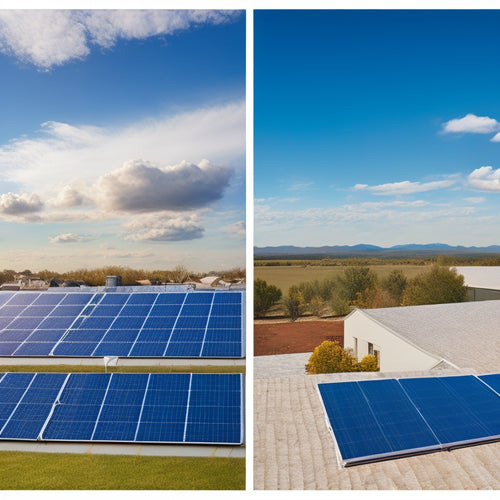
Top Solar Panels and Batteries for Residential Use
Share
You're looking for the best solar panels and batteries for your residential use. Start with high-efficiency solar panels from top brands like Panasonic, LG Solar, and SunPower, which offer efficiencies above 20%. When it comes to batteries, consider lithium-ion options like those from LG Chem and Tesla, which provide higher energy density and longer lifespans. Don't forget to evaluate your energy storage needs, considering factors like battery management and scalability. With the right combination of panels and batteries, you can maximize your energy independence and reduce your carbon footprint. Now, investigate the specifics of each component to find the best fit for your home.
Key Takeaways
- Choose solar panels with high efficiency ratings (above 20%) and durable materials like monocrystalline silicon for optimal energy production.
- Select top solar panel brands like Panasonic, LG Solar, and SunPower for reliable performance and impressive warranties.
- Consider lithium-ion batteries for energy storage due to their high energy density and long lifespan, despite being more costly.
- Evaluate battery management systems (BMS) and compatibility with existing solar panel systems and inverters for efficient energy storage.
- Assess solar panel warranty providers based on warranty duration, performance guarantees, and workmanship reliability for a hassle-free experience.
Top-Rated Solar Panels for Homes
Your rooftop is about to become a power-generating hub with the right solar panels. With the latest solar panel trends, you can utilize the sun's energy efficiently and reduce your carbon footprint.
When selecting top-rated solar panels for your home, consider the following installation tips. First, assess your roof's size, orientation, and shading to determine the ideal panel configuration.
Next, choose panels with high-efficiency ratings (above 20%) and durable materials (e.g., monocrystalline silicon) to guarantee peak performance and longevity. Additionally, look for panels with built-in inverters or microinverters to enhance energy conversion.
Consider the warranty and maintenance requirements, as well as the manufacturer's reputation and customer support. By following these guidelines, you can maximize your solar panel investment and enjoy a reliable, eco-friendly power source.
Research and compare top brands, such as Tesla, Panasonic, and SunPower, to find the best fit for your residential solar energy needs.
Best Batteries for Solar Systems
When sizing up your solar energy system, you'll often find that batteries play an important role in storing excess energy generated during the day for later use. This allows you to power your home during the night or on cloudy days, maximizing your energy independence.
For ideal performance, it's vital to choose the right battery for your solar system. Look for batteries with high depth of discharge (DOD) ratings, as they can store more energy. Additionally, consider batteries with advanced battery management systems (BMS) that regulate charge and discharge rates, guaranteeing safe and efficient operation.
To maximize energy efficiency, implement energy efficiency strategies such as load shifting, where you schedule energy-intensive tasks during the day when your solar panels are generating power.
Regular battery maintenance tips include monitoring your battery's state of charge, checking for signs of wear and tear, and performing routine software updates.
Residential Solar Panel Brands
With a reliable battery in place, it's time to focus on the heart of your solar energy system: the solar panels themselves.
When it comes to residential solar panel brands, you've got a multitude of options to choose from. Here are some of the top contenders:
-
Panasonic: Known for their high-efficiency solar panels, Panasonic offers a range of options suitable for residential installation.
-
LG Solar: LG's solar panels boast impressive warranties and high-performance ratings, making them a popular choice for homeowners.
-
Trina Solar: Trina's solar panels offer a balance of affordability and performance, making them an attractive option for those looking for a reliable residential solar solution.
-
Hanwha Q CELLS: With a focus on innovation and sustainability, Hanwha Q CELLS' solar panels are designed to provide maximum energy output and durability.
-
Canadian Solar: Canadian Solar's extensive range of solar panels caters to various residential installation needs, from small to large-scale projects.
When making your solar panel comparisons, consider factors like efficiency, warranty, and durability to guarantee you're getting the best fit for your residential solar energy system.
High-Efficiency Solar Panel Options
High-efficiency solar panels optimize energy production by maximizing power output per unit area, making them an attractive option for residential installations where roof space is limited. You'll benefit from higher energy yields, even with smaller systems, which can be a transformative factor for urban homes or those with complex rooflines.
High-efficiency solar panel technology has evolved greatly, offering improved performance and reliability. Top manufacturers like SunPower, Panasonic, and LG offer high-efficiency options with efficiencies ranging from 20% to over 22%. These panels are designed to minimize energy losses, ensuring you get the most out of your solar investment.
Here's a comparison of high-efficiency solar panels from top manufacturers:
| Manufacturer | Efficiency (%) | Power Output (W) |
|---|---|---|
| SunPower | 22.8% | 440 |
| Panasonic | 21.8% | 410 |
| LG | 20.5% | 390 |
Deep Cycle Battery Recommendations
When selecting a deep cycle battery for your residential solar panel system, you'll need to evaluate the type of battery that best suits your needs, such as flooded lead-acid, sealed lead-acid, or lithium-ion batteries.
Each type has its own advantages and disadvantages, and your choice will depend on factors like maintenance requirements, cost, and desired lifespan.
You'll also want to assess the charging cycle life of the battery, as this will impact how often you'll need to replace it.
Battery Type Options
In selecting a battery for your residential solar panel system, you face an essential decision that can greatly impact your energy storage and overall system performance.
With various battery type options available, it's vital to understand their differences to make an informed choice.
When evaluating battery types, consider the following key factors:
-
Lithium Iron (LiFePO4) Batteries: Known for high energy density, long lifespan, and excellent thermal management, making them a popular choice for residential solar systems.
-
Lead Acid Batteries: Cost-effective and widely available, but heavier and less efficient than lithium-ion batteries, with shorter lifespans.
-
Flow Batteries: Ideal for long-duration energy storage, offering flexible capacity and scalable design, but often larger and more expensive.
-
Gel Batteries: A type of lead-acid battery with a gel-like electrolyte, providing improved safety features and reduced maintenance.
-
Nickel Cadmium (Ni-Cd) Batteries: Less common due to toxicity concerns, but still used in some applications, offering high discharge rates and long lifetimes.
When choosing a battery, consider factors such as battery capacity, thermal management, safety features, installation considerations, and recycling options to guarantee the best fit for your residential solar panel system.
Charging Cycle Life
Your residential solar panel system's battery life expectancy largely depends on its charging cycle life, a critical factor to evaluate when selecting a deep cycle battery. A charging cycle refers to the process of discharging and recharging your battery, and the number of cycles it can handle affects its overall lifespan.
When choosing a deep cycle battery, look for ones with a high cycle life rating, typically measured in the number of cycles at a specific depth of discharge (DOD).
For example, a battery rated for 3,000 cycles at 50% DOD means it can handle 3,000 charge-discharge cycles before its capacity drops to 80% of its original state. Higher cycle life ratings generally translate to a longer battery lifespan.
Be cautious of manufacturers that don't provide clear cycle life ratings or use ambiguous terminology, as this can make it difficult to compare products. Instead, opt for reputable brands that transparently disclose their battery's charging cycle life to guarantee you get the most out of your residential solar panel system.
Solar Energy Storage Solutions
You're likely wondering how to store the excess energy generated by your solar panels for later use.
This is where solar energy storage solutions come in, providing you with a reliable way to power your home when the sun isn't shining.
You'll want to contemplate battery backup systems and various energy storage options to guarantee a steady supply of electricity.
Battery Backup Systems
A reliable battery backup system is the unsung hero of residential solar energy, providing a seamless shift to stored power during grid outages or when the sun isn't shining.
You can rest confident that your home will remain powered even when the grid goes down.
When choosing a battery backup system, consider the following key factors:
- Compatibility with your existing solar panel system and inverter
- Depth of discharge (DOD) to guarantee maximum energy storage
- Round-trip efficiency to minimize energy loss
- Scalability to accommodate your growing energy needs
- Integration with home energy management systems for peak performance
Energy Storage Options
Selecting the right energy storage option is essential to optimizing your residential solar energy system. You want to guarantee that you can store excess energy generated by your solar panels during the day for use during the night or on cloudy days. This is where energy storage options come in.
You have several options to choose from, including lead-acid batteries, lithium-ion batteries, and flow batteries. Each type has its pros and cons, and the right choice for you'll depend on your specific needs and budget.
Lithium-ion batteries, for instance, are more expensive but offer higher energy density and longer lifetimes. Lead-acid batteries, on the other hand, are more affordable but heavier and less efficient.
When selecting an energy storage option, consider your energy independence goals and sustainability practices. Do you want to be completely off the grid, or just reduce your reliance on the utility company?
Do you prioritize environmental impact or cost-effectiveness? By answering these questions, you'll be able to choose the energy storage solution that best fits your needs and helps you achieve your sustainability goals.
Powering Your Home
When it comes to powering your home with solar energy, one essential aspect is ensuring a steady supply of electricity even when the sun isn't shining. This is where solar energy storage solutions come in.
By investing in a reliable energy storage system, you can reap the full benefits of solar energy and enjoy a sustainable living experience.
Some key advantages of solar energy storage solutions include:
- Providing backup power during grid outages
- Reducing your reliance on the grid and lowering your energy bills
- Allowing you to store excess energy generated during the day for use at night
- Enabling you to power your home with clean, renewable energy
- Increasing the overall efficiency of your solar panel system
Residential Solar Inverter Options
Your solar panel system's brain, the inverter, plays an essential role in converting DC power from the panels into AC power for your home. This conversion process is vital, as it allows you to utilize the energy generated by your solar panels and use it to power your appliances and lighting.
When selecting an inverter, you'll need to evaluate the type that best suits your system. There are three main inverter types: string inverters, microinverters, and power optimizers. Each has its advantages, such as increased efficiency, flexibility, and monitoring capabilities.
When assessing inverter features, look for high-efficiency ratings, as they can reduce energy losses and increase your overall energy production. Additionally, contemplate inverters with built-in monitoring systems, which allow you to track your energy production and identify potential issues.
Other key features include maximum power point tracking (MPPT) and grid support capabilities. By choosing the right inverter for your residential solar panel system, you can maximize your energy production and enjoy a reliable, efficient source of power.
Top Solar Panel Warranty Providers
Investing in a solar panel system is a significant decision, and guaranteeing you're protected with a thorough warranty is vital. A complete warranty provides peace of mind, safeguarding your investment from unexpected repair or replacement costs.
When evaluating solar panel warranty providers, it's important to reflect on the following key factors:
-
Warranty duration: Look for providers offering warranties with a minimum of 25 years, guaranteeing your system remains protected throughout its expected lifespan.
-
Performance guarantee: A reputable provider should guarantee a certain level of energy production, usually between 80-90% of the initial output.
-
Panel degradation rate: Opt for providers with a degradation rate of 0.5% or less per year, guaranteeing your system maintains its efficiency.
-
Workmanship warranty: Confirm the provider offers a thorough workmanship warranty, covering installation and labor costs.
-
Provider reliability: Research the provider's reputation, customer reviews, and financial stability to guarantee they'll be around to honor their warranty commitments.
Solar Battery Cost and Value
As you weigh the benefits of a solar panel system, considering the cost and value of solar batteries becomes an essential aspect of your decision-making process, since these energy storage solutions can greatly impact your overall return on investment.
The cost of solar batteries can vary depending on factors such as the type, capacity, and brand of the battery. On average, a solar battery installation can cost between $5,000 and $15,000 or more, depending on the size of the system. However, with solar battery financing options available, you can spread the cost over time, making it more affordable.
| Cost Factor | Average Cost |
|---|---|
| Installation | $5,000 - $10,000 |
| Battery Type (e.g. Lithium-ion) | $3,000 - $5,000 |
| Capacity (e.g. 10 kWh) | $2,000 - $4,000 |
When evaluating the value of solar batteries, consider the benefits they provide, such as increased energy independence, reduced grid reliance, and potential savings on your electricity bill. By understanding the costs and benefits, you can make an informed decision about whether solar batteries are right for your residential solar panel system.
Frequently Asked Questions
Can I Install Solar Panels on My Roof if It's Partially Shaded?
You can install solar panels on a partially shaded roof, but you'll need to take into account shading effects on energy output. Investigate installation options like panel placement, tree trimming, or using microinverters to minimize the impact of shading on your system's performance.
How Long Does It Take to See a Return on My Solar Investment?
You'll likely see a return on your solar investment within 5-7 years, depending on your location, energy usage, and system size. Conducting an investment analysis reveals your solar payback period, helping you make an informed decision about going green.
Are Solar Panels Resistant to Extreme Weather Conditions?
You'll be relieved to know that most solar panels boast impressive durability, withstanding extreme weather conditions like hail, high winds, and heavy snow loads, ensuring your investment remains resilient and generating power for years to come.
Can I Use My Solar Panels During a Power Outage?
During a power outage, you can't use your solar panels alone, as they're grid-tied for safety; however, with a battery backup system, you'll achieve grid independence, ensuring your solar panel safety while powering your home during outages.
Do Solar Panels Require Regular Maintenance to Operate Efficiently?
While you're enjoying the independence of generating your own power, you're probably wondering if your solar panels need regular TLC to perform at their best - the answer is yes, with routine solar panel cleaning and system monitoring to guarantee maximum energy harvesting.
Related Posts
-

Master Advanced Solar Panel Design Online for Free
You can master advanced solar panel design online for free by leveraging specialized courses and training platforms, ...
-

What You Need to Know About Permits and Inspections
You need to navigate the complex landscape of permits and inspections to guarantee your project complies with local z...
-

Tracking Solar Panels Vs Fixed Panels Cost Savings
When considering solar panel options, you'll want to weigh the cost savings of tracking solar panels versus fixed pan...


